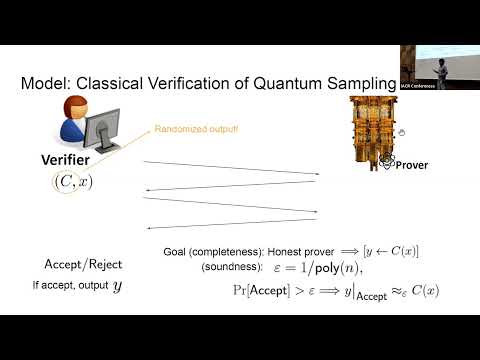CryptoDB
Constant-round Blind Classical Verification of Quantum Sampling
| Authors: |
|
|---|---|
| Download: | |
| Presentation: | Slides |
| Conference: | EUROCRYPT 2022 |
| Abstract: | In a recent breakthrough, Mahadev constructed a classical verification of quantum computation (CVQC) protocol for a classical client to delegate decision problems in BQP to an untrusted quantum prover under computational assumptions. In this work, we explore further the feasibility of CVQC with the more general sampling problems in BQP and with the desirable blindness property. We contribute affirmative solutions to both as follows. * Motivated by the sampling nature of many quantum applications (e.g., quantum algorithms for machine learning and quantum supremacy tasks), we initiate the study of CVQC for quantum sampling problems (denoted by SampBQP). More precisely, in a CVQC protocol for a SampBQP problem, the prover and the verifier are given an input x\in{0, 1}^n and a quantum circuit C, and the goal of the classical client is to learn a sample from the output z\leftarrow C(x) up to a small error, from its interaction with an untrusted prover. We demonstrate its feasibility by constructing a four-message CVQC protocol for SampBQP based on the quantum Learning With Errors assumption. * The blindness of CVQC protocols refers to a property of the protocol where the prover learns nothing, and hence is blind, about the client’s input. It is a highly desirable property that has been intensively studied for the delegation of quantum computation. We provide a simple yet powerful generic compiler that transforms any CVQC protocol to a blind one while preserving its completeness and soundness errors as well as the number of rounds. Applying our compiler to (a parallel repetition of) Mahadev’s CVQC protocol for BQP and our CVQC protocol for SampBQP yields the first constant-round blind CVQC protocol for BQP and SampBQP respectively, with negligible and inverse polynomial soundness errors respectively, and negligible completeness errors. |
Video from EUROCRYPT 2022
BibTeX
@inproceedings{eurocrypt-2022-31968,
title={Constant-round Blind Classical Verification of Quantum Sampling},
publisher={Springer-Verlag},
author={Kai-Min Chung and Yi Lee and Han-Hsuan Lin and Xiaodi Wu},
year=2022
}

